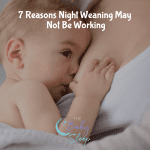
For many of the families we work with, night weaning and sleep training are both high priorities. After all, constant night feeds can exhaust even the strongest parents! And a baby who can’t fall asleep independently is often one who will wake too early from a nap, or wake during the night due to sleep associations.
So yeah… When it comes to night weaning and sleep training, most parents would say, “Both, please!” But this raises an interesting question. Should one come before the other? Our team discussed this question recently, and we thought you’d really enjoy getting a peek into our answers!
Keep reading to learn which you should work on first: night weaning or sleep training!
Night Weaning vs. Sleep Training: Usually, Sleep Training Comes First
Let’s cut right to the chase. Typically, we recommend working on sleep training first. When we create Personalized Sleep Plans® for families, we typically put night weaning after sleep training in the day-by-day section of the plan. Why? Because when a baby is able to fall asleep independently, without needing any help in the form of sleep associations, most families find that night waking decreases dramatically. Some of the “night feedings” (that were actually just plain old night wakings) disappear on their own.
When a baby knows how to fall asleep without help at bedtime, or at the start of a nap, then he can often go BACK to sleep when he wakes at night between sleep cycles (and doesn’t need a feeding), or in the middle of a nap. So, if your baby is in the habit of waking frequently at night, odds are many of those night wakings will disappear via the process of sleep training.
Then, once you’ve worked on helping your baby learn to fall asleep independently at bedtime and night wakings, you can start to work on the process of night weaning. (IF you and your baby are ready to drop feedings.)
For more information on sleep coaching your baby, check out these resources:
- Sleep Training Cheat Sheet: 5 Popular Sleep Coaching Methods
- 5 Ways To Help Your Baby Sleep Through The Night
- How To Create A Sleep Coaching Plan (VIP Members Only article)
Night Weaning vs. Sleep Training: 4 Times To Try Night Weaning BEFORE Sleep Training
While most families do best starting with sleep training and then moving on to night weaning, in some situations, it’s actually best to reverse that process and start with night weaning first. Those situations include…
1. Medical reasons. In some rare situations, parents are faced with a medical scenario in which they have to wean from breastfeeding immediately. For instance, we’ve worked with moms who, after a cancer diagnosis, have to wean before undergoing chemotherapy. In situations like these (and depending on baby’s age), it usually makes sense to wean from night feedings while you’re in the process of weaning to formula (if your child is 12 months or younger and still needs formula). Of course, if your baby still needs 1 or more age-based night feedings, keep those. But, this is a great time to work on reducing any unnecessary night feedings.
2. A toddler who wakes ONLY for 1-2 feedings a night. While some toddlers have serious sleep problems, we’ve worked with many toddler families whose only real problem was one or two night feedings that they wished to get rid of. In these cases, the toddlers usually fall asleep fine at bedtime, wake up to feed once or twice, go right back to sleep on their own, and then sleep until morning. In cases like these, since there are no real sleep problems aside from the night feedings, it makes sense to work on gradually night weaning.
3. Families who want to continue sharing a bed. We see this fairly often… Attachment families who want to continue to share a family bed want to reduce or eliminate night feedings, but don’t want to transition baby to a crib. In these cases, what the parents want is a period of sustained sleep without feedings. So it makes sense to start with night weaning and to teach baby to fall back to sleep without feeding. To do this, we usually create a special bed-sharing plan. This teaches the parents how to gradually help baby fall back to sleep after a waking without needing to nurse.
4. Babies who are always fed during every night waking. Now, it can be hard to distinguish exactly when night feedings have become a deeply ingrained habit. If you ALWAYS feed your baby EVERY time she wakes, you may want to start offering other forms of comfort. Start this before you start actually sleep training. As one of our sleep consultants put it… “If a family has never tried offering a pacifier at 2 a.m. instead of a feeding, or simply holding and patting the baby, instead of feeding, then we usually start off trying that.” Honestly, you’d be amazed at how just this small change to the usual routine can help decrease night wakings. This can provide a great start to sleep coaching!
For more information about night weaning your baby, take a look at these resources:
- Night Weaning Quiz: Is Your Baby Ready To Night Wean?
- 3 Signs It May Be Time To Night Wean
- 4 Ways to Night Wean a Baby
- Night-Weaning: How To and Common Pitfalls (VIP Members Only audio course)
- How Fixed and Fluid Schedules Can Help Your Night Wean (VIP Members Only article)








